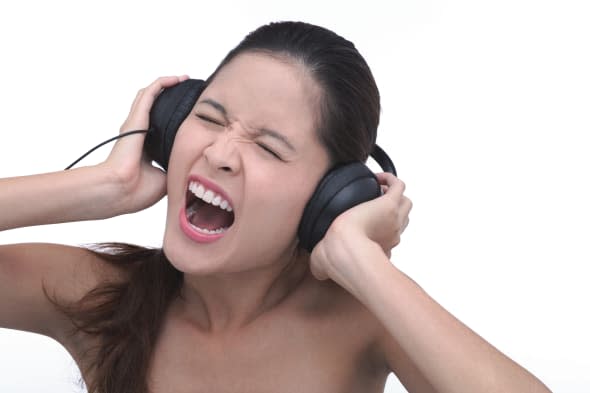How to protect your hearing

Pic: Getty Images/AsiaPix RF
Most of us would struggle to imagine life without our hearing, but with so many now using headphones on a daily basis, often at ever louder levels, damage to hearing is a real possibility. If you are worried about your hearing health, here's what you need to know.
Related Searches
How is the damage done?
According to the NHS, around four out of five cases of deafness are caused by damage to the tiny hair cells in the inner ear, and often it is a direct result of too much noise. The louder the sound, the greater the damage, and noise-related hearing loss is usually permanent.
It can occur as a result of a short, very loud noise, such as fireworks, but is often caused by prolonged exposure to loud noise, either from MP3 players and headphones, or the volume of speakers at gigs and clubs. As an example, the volume of a normal conversation would be measured at around 60 decibels. By contrast, an MP3 player with the volume turned up would expose you to 112 decibels, while the decibel level at a live rock gig could hit 120. The Health and Safety Executive advise that noise levels above 105 decibels for just 15 minutes per week could damage your hearing. Continued exposure to noise above 85 decibels can also cause hearing loss over a long period of time.
If you experience ringing in your ears or your hearing is dulled after listening to music, it's time to turn it down.
How to protect your hearing
Ear protectors
For anyone truly worried about their hearing health, earplugs are an investment worth making. If you regularly use loud power tools or noisy equipment, ear protectors or earplugs will help to reduce the likelihood of damage caused over time. If you are exposed to loud noises at work on a regular basis, health and safety should afford you some protection, so speak to your employer for advice about what should be available to you.
Safe volumes
Music lovers should pay particular attention to advice on protecting their hearing, since the use of headphones and loud music is a growing concern. The NHS advises taking heed of the 60:60 rule, which suggests you should listen to music at 60 per cent of the MP3 player's maximum volume for no more than 60 minutes each day. If the music is loud enough that it is uncomfortable to listen to, turn down that dial. When it comes to radios, stereos and TVs at home, you should be able to have a conversation without shouting. Again, if you need to raise your voice to be heard, it's too loud.
Choose the right kit
Ear buds and in-ear headphones might be convenient, but they're not brilliant at blocking out background noise, which means users often turn the volume up to compensate. Instead, consider noise-cancelling, over-ear headphones that will drown out unwanted sounds without requiring a volume boost.
%VIRTUAL-AFCSponserAds%
Take a break
Like any other bit of your body, your ears need a break, and this is particularly true if you've been out to a club, gig or have been exposed to loud noise for a prolonged period, such as at work. Deafness Research UK reports that after two hours of sound at 100 decibels, your ears need at least 16 hours of rest in order to recover and reduce the risk of lasting damage. So make sure you switch off or turn it down every now and again - it just might save your hearing.




